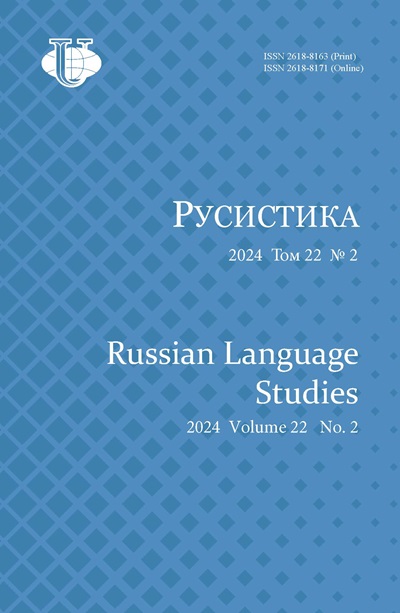Issue
Title
Authors
|
Reagan T.G. |
|
Strelchuk E.N., Ilikhamu S. |
|
Ageeva A.V., Abdullin L.R., Gabdreeva N.V. |
|
Merkulova I.A., Protsenko E.A. |
|
Bozhenkova N.A., Rubleva E.V., Baharloo H. |
|
Nikitina T.G., Rogaleva E.I. |
|
Mamontov A.S., Boguslavskaya V.V., Ratnikova A.G. |
|
Lebedeva M.Y., Wu D. |
|
Sysoyev P.V., Filatov E.M. |
|
Mikova S.S., Kataeva I.V., Ndyay M. |
|
Gorozhankina T.N., Grechukhina V.V. |
|
Li Y. |
|
Dolzhikova A.V. |
|
Muhammad L.P., Ippolitova L.V., Zhang S. |
|
Sarycheva M.R., Derybina S.A. |
|
Denisenko A.V., Bereznyatskaya M.A., Kalinina J.M. |
|
Kozhevnikova M.N., Khamraeva E.A., Kytina V.V. |
|
Pugachev I.A., Iarkina L.P., Din T.T. |
|
Bobrova M.V. |
|
Dziuba E.V. |
|
Dubinina N.A., Ptiushkin D.V. |
|
Kozhevnikova E.V., Vyazovskaya V.V., Trubchaninova M.E. |
|
Farysenkova L.V., Zhellali E.I. |
|
Nedosugova A.B. |
|
Vokhmina L.L., Klobukova L.P. |
|
Baranova I.I. |
|
Dyakova T.A., Khvorova L.E. |
|
Pashkovskaya S.S. |
|
Pashkovskaya S.S. |
|
Laposhina A.N., Lebedeva M.Y. |
|
Markova E.M., Kvapil R. |
|
Baranova I.I., Chuvaeva K.M. |
|
Talibina E.V., Polyakova E.V., Minakova N.A. |
|
Azimov E.G. |
|
Zagorovskaya O.V., Biryukova E.D. |
|
Guzhelya D.Y. |
|
Velichko A.V. |
|
Hamsovszki S.A. |
|
Makarov V.I. |
|
Govorukhina Y.A., Mongina F.M. |
|
Krasnokutskaya N.V. |
|
Tarasova N.I. |
|
Vorobiev V.V. |
|
Krotova T.A. |
|
Strelchuk E.N. |
|
Hmira T. |
|
Antonova L.N., Tolstyakova K.P. |
|
Shustikova T.V., Žurkina N.V. |
|
Rozboudova L., Konecny J., Markova E.M. |
|
Zhang W., Vesnina L.E. |
|
Kulsha D.N., Ryabokoneva O.V. |
|
Khavronina S.A., Emrak K. |
|
Zhiltsov V.A., Maev I.A. |
|
Kozdra M. |
|
Petrova S.M. |
|
Iljina S.A., Ivanova I.S. |
|
Shtirina E.V. |
|
Konstantinova L.A., Pronina E.V. |
|
Deryabina S.A., Liubimova N.A. |
|
Nikitin O.V. |
|
Vyazovskaya V.V., Danilevskaya T.A., Trubchaninova M.E. |
|
Wik N.O. |
|
Ojuunchuluun B. |
|
Semenistaja M.N. |
|
Timoshenko T.E., Ushakova O.A., Shuvalov V.L. |
|
Eremina E.A. |
|
Shtyrina E.V. |
|
Loginova I.M. |
|
Berardi S. |
|
Bai Y., Zheltukhina M.R. |
|
Ershova O.V., Yaroslavskaya I.I. |
|
Sveshnikova O.A. |
|
Brygina A.V., Zorina G.S. |
|
Shutova M.N., Orekhova I.A. |
|
Cherkashina T.T., Novikova N.S., Sayenko T.I. |
|
Klimenko E.N. |
|
Loginova I.M. |
|
Constantinova L.A., Zubareva Y.M. |
|
Ndyay M., Nguyen W.T., Grunina E.O. |
|
Bozhenkova N.A., Bozhenkova R.K., Shulgina N.P. |
|
Serova L.K., Shabaeva A.V. |
|
Kytina V.V. |
|
Minakova N.A., Talybina E.V. |
|
Deryabina S.A. |
|
Tsareva N.Y., Budiltseva M.B. |
|
Bereznjatskaja M.A., Serova L.K. |
|
Balakina K.D. |
|
Senatorova O.A. |
|
Mamontov A.S. |
|
Zolotykh L.G., Tsiu S. |
|
Ipatova G.N., Serova L.K. |
|
Gynin V.I. |
|
Shmelkova V.V. |
|
Rumjanseva N.M. |
|
Abrosimova O.L., Voronova L.V. |
|
Erofeeva I.N., Popova T.I. |
|
Moskovkin L.V. |
|
Koltsova L.M., Kudryavtseva T.Y., Churikov S.A. |
|
Baryshnikova E.N., Shtyrina E.V. |
|
Demeneva K.A. |











